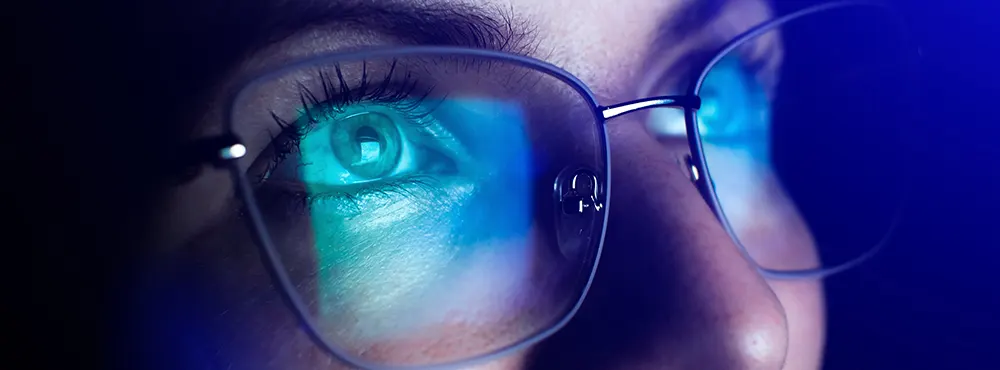
 Offers
Offers-
 Account
Account
-
0
 Favorite
Favorite
-
0
 Basket
Basket



The electronic screen has become ubiquitous in today’s technological world of information; on demand, at your fingertips and through your eyes! Televisions, mobile phones, laptops and now even smart watches. Evidence suggests that this could be having a negative effect on your eyes and also, the quality of your day!
Blue light occupies a section of the light spectrum that is characterised by a very short wavelength – this means that it emits more energy and is more difficult to look at directly. Blue light falls just below UVA – a light for which you ought to wear protective glasses or lenses. As part of the visible spectrum in the sun’s rays, blue light helps to keep you awake by suppressing melatonin. Blue light features heavily in electronic screens and fluorescent lighting that we find everywhere in modern life.
The problems of blue light only intensify with age; your natural lenses become yellowed and the retina fails to register blue light. This means that your melatonin levels level out and your body’s natural rhythm becomes disturbed. This type of light can also affect your sleep if you’re exposed to it too late in the evening. Blue light supresses your body’s release of melatonin (the hormone that makes us feel sleepy) which consequently tricks our body into thinking it’s daytime and that we should be awake.
There are several proactive things you can do to prevent blue light from impacting your life. The most obvious one would be to reduce the amount of time you spend looking at a screen in the evening, before sleep. If it’s possible, try and then see if it makes a difference. There’s a very good chance it will make a noticeably positive one. However, that won’t always be possible. There are a number of free apps that you can purchase for your phone, tablet or computer, which can apply a reddish filter in the evenings. These can be programmed to come on automatically, fitting in with your daily routine. You could also put a dim red bulb into your bedside lamp or bedroom light. The idea may sound quite strange but do remember that until not that long ago, humans didn’t really carry the expectation of so much light, so late in the day.
At Feel Good Contacts we stock a range of products that promote good eye care routines (or we can say 'good eye health’ such as I-Caps, heat mask and eye drops.
Disclaimer: The advice in this article is for informational purposes only and does not replace medical care or an in-person check-up. Please check with an eyecare professional before purchasing any products or remedies. For information on our article review process, please refer to our Editorial Policy.